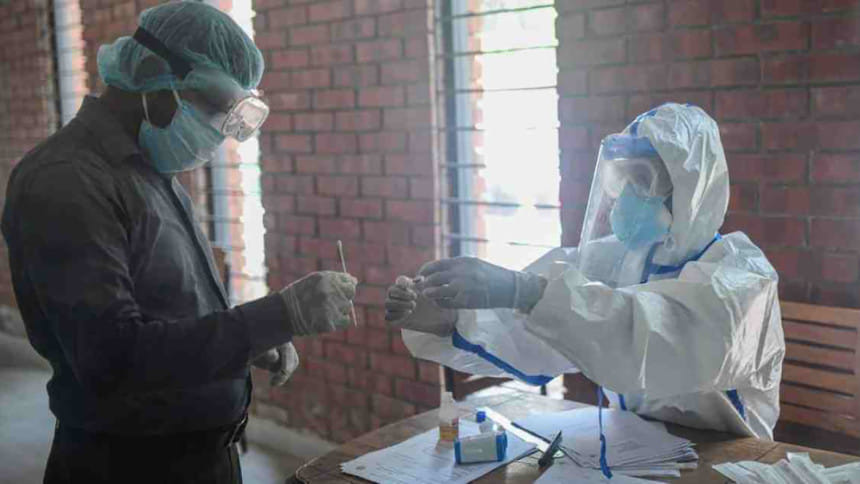Decision to reduce number of Covid-19 hospitals worries experts

The government has decided to gradually suspend providing treatment at 12 dedicated Covid-19 hospitals saying that the number of coronavirus affected patients seeking treatment there has fallen sharply in the last few weeks.
Health experts, however, fear that this will be a premature decision that sends the wrong message to people already reluctant about health guidelines surrounding the pandemic and make them more reckless in flouting social distancing and health safety guidelines amid a warning that Bangladesh may witness a second wave of the highly transmissible virus.
Stating that there is a growing tendency to receive treatment for coronavirus at home, experts think the government should take steps to encourage patients to go to hospitals and isolation centres to further rein in the spread and fatality rate instead of reducing the number of Covid-19 hospitals.
Health Secretary Md Abdul Mannan said they have decided to gradually reduce the number of dedicated Covid-19 hospitals due to the poor presence of patients.
He said they have already suspended coronavirus treatment at Dhaka's Holy Family Red Crescent Medical College Hospital.
"We've to spend a lot of money on the dedicated Covid-19 hospitals as several hundred doctors are engaged with them. But the number of patients has dropped significantly at many such hospitals. So, it's not justified to run all the Covid-19 hospitals now," he said.
He said 172 doctors are engaged with Bashundhara Covid-19 Hospital but only 14 patients are receiving treatment there. "So, we can now close this makeshift hospital."
Farid Hossain Miah, director (hospitals and clinics) at the Directorate General of Health Services (DGHS), said they recently sent a list of 12 dedicated Covid-19 hospitals out of 64 in eight divisions to the Health Ministry for suspending operations.
The hospitals include Holy Family Hospital, Dhaka Mahanagar Hospital, Lalkuthi MA O Shishu Kalyan Kendro, Bashundhara Covid Hospital, Infectious Disease Hospital at Mohakhali, Bangladesh Institute of Tropical and Infectious Diseases (BITID), Chattogram, Chattogram Railway Hospital, Field Hospital, Chattogram and four others in Dhaka and Chattogram.
"We've already shut the coronavirus unit at Holy Family Hospital and we're waiting for approval to suspend operation at 11 other hospitals," Farid said.
He also said they are planning to gradually shut down coronavirus units at hospitals treating both Covid-19 and non-Covid-19 patients to facilitate treatment of non-coronavirus patients.
Prof Nazrul Islam, a member of the National Technical Advisory Committee (NTAC) on Covid-19, said people are now reluctant to undergo tests and get treatment at hospitals due to their lack of 'confidence' in public health services as well as awareness about the disease.
He also said people are now not taking the virus seriously.
"People are not getting information about the exact situation as the government stopped briefing on the coronavirus situation without any reason."
As people know that 85 percent coronavirus patients can recover by receiving treatment at home, the virologist said they are not coming to hospitals.
"Doctors are saying people are now coming to hospitals when their condition gets critical.
"If Covid-19 hospitals are now closed, it'll send out a negative message to people again. So, instead of reducing the Covid-19 hospitals, the government should take steps to get people to come to the hospitals."
Dr Be-Nazir Ahmed, former director (disease control) of the DGHS, said the government needs a proper projection and assessment of the situation before suspending operation at Covid-19 hospitals.
"Many experts are saying the situation may deteriorate in the days to come and Bangladesh may witness a second wave. We need a contingency plan so that we can handle any emerging situation. If we close down the hospitals without any projection and plan, we may have to pay a price when the situation will aggravate," he observed.
He said the government can reduce the number of doctors if the number of patients declines at the Covid-19 hospitals. "But we're not in a position to suspend operation of Covid-19 hospitals."
The health expert said the growing tendency of patients to avoid hospitals is weakening the government's efforts to control the situation.
"First of all, if coronavirus patients stay home, they don't maintain proper isolation and there's a chance that their relatives may be infected. Secondly, since they stay home they can't assess their situation and oxygen saturation levels. But the fall in saturation levels may affect the patients' kidneys and livers, especially those who have comorbidities. So, when they're taken to hospitals at the last stage, doctors can't save many of them. This is the reason we're seeing a high mortality rate, although the infection rate has declined," he added.
Prof Muzaherul Huq, a former adviser to WHO South-East Asia region, said Bangladesh is still in the list of countries where coronavirus infection may increase again.
"So, I think we should take more time to come to a decision to suspend operation at Covid-19 hospitals since there's a global projection that the infection may increase here. We should encourage people who are above 40, with underlying health conditions, to go to hospitals as the death rate among this age group is high," he observed.

 For all latest news, follow The Daily Star's Google News channel.
For all latest news, follow The Daily Star's Google News channel. 



Comments